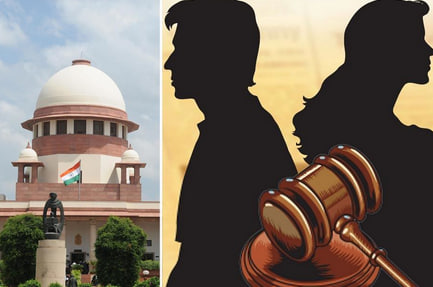A good divorce: On the Supreme Court of India’s ruling
Irretrievable breakdown of marriage should be a ground for divorce
Not all marriages are happy, and not all divorces are unhappy. For those who want to opt-out of a bad marriage, Monday’s Supreme Court ruling on divorce will be seen as a good move . Leaning on the “ guiding spirit ” of Article 142(1) of the Constitution to do “complete justice” in any “cause or matter”, a Constitution-Bench said it could use this extraordinary discretionary power to grant divorce by mutual consent to couples trapped in bitter marriages. It also aims to spare couples the “ agony and misery ” of waiting six to 18 months for a local court to annul it, as stipulated under Section 13B of the Hindu Marriage Act, 1955. The Bench , headed by Justice Sanjay Kishan Kaul, observed that the law of divorce, built predominantly on assigning fault, fails to serve broken marriages. It pointed-out that if a marriage is wrecked beyond hope, public interest lies in recognising this fact, not upholding a ‘married’ status regardless . The Court said it could use Article 142 to quash pending criminal or legal proceedings , be it over domestic violence or dowry , against the man or woman. Continuing in this strain , the Bench said the Supreme Court could grant divorce on the grounds of an “irretrievable breakdown of marriage” if the “separation is inevitable and the damage is irreparable ”. Under the Hindu Marriage Act, irretrievable breakdown of marriage is not yet a ground for divorce.
In its judgment, there was a word of caution that the grant of divorce would not be a “matter of right, but a discretion which is to be exercised with great care… keeping in mind that ‘complete justice’ is done to both parties.” Several factors would be considered by the Supreme Court before invoking Article 142 in matrimonial cases, including duration of marriage, period of litigation , the time the couple has stayed apart , the nature of pending cases, and attempts at reconciliation . The Court will have to be satisfied that the mutual agreement to divorce was not under coercion . In India, while divorcees have doubled in number over the past two decades , the incidence of divorce is still at 1.1%, with those in urban areas making-up the largest proportion. But the divorce numbers do not tell the whole story; there are many women, particularly among the poor, who are abandoned or deserted . Census 2011 revealed that the population which is “separated” is almost triple the divorced number. In a country which is largely poor, where gender discrimination is rife and many women are still not financially independent, the Court’s stress on “care and caution” and not to rush-into a quick divorce must be welcomed. After all, marriage equality is not a reality for all.
